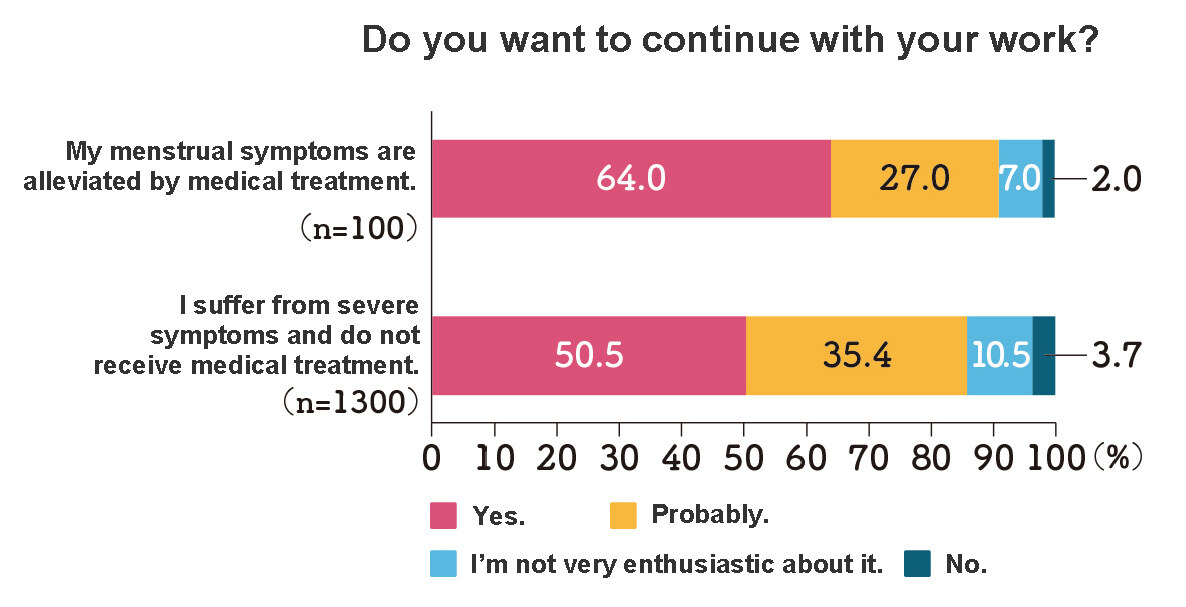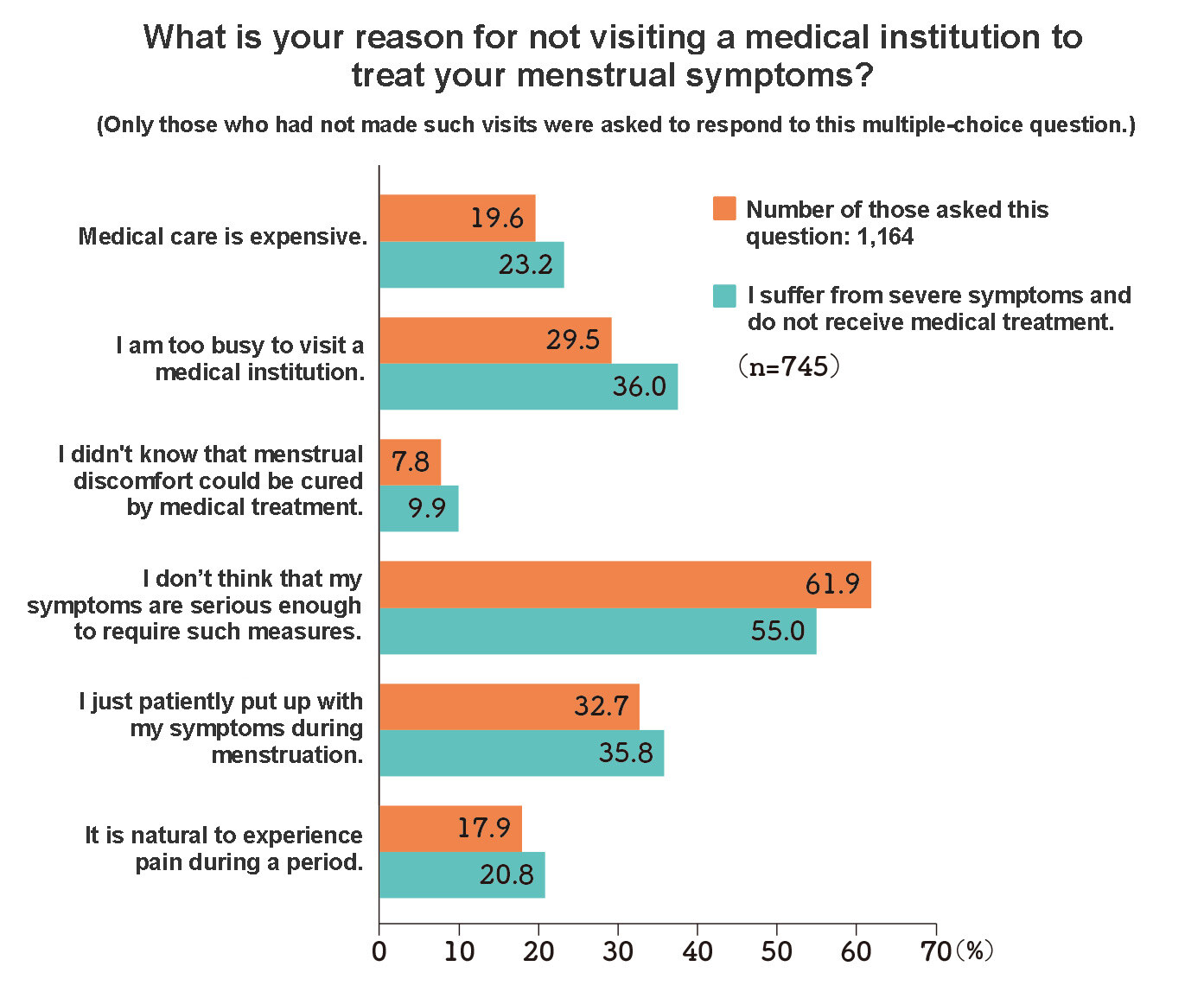- Alternative Data
- ESG
- Healthcare Research
Menstrual Leave Alone Is Not Enough - More Focus on Medical Support Is a Must

According to Survey on How Menstrual Problems Affect Work and Life of 1,956 Working Women in their 20s-40s (Part 3)
By Mizuho Yonekawa, Medical and Healthcare Institute, Nikkei BP Intelligence Group
Wellbeing of Working Women
- Part 1 : Employee Wellbeing Management Needs Care for Period-friendly Workplace
- Part 2 : Less than 10% of Female Employees Take Menstrual Leave
- Part 3 : Menstrual Leave Alone Is Not Enough - More Focus on Medical Support Is a Must (this article)
- Part 4 : Actual Demand for Workplace Menstrual Support Measures
The Survey on How Menstrual Problems Affect Work and Life of 1,956 Working Women was conducted by Nikkei BP Intelligence Group as part of its Comfortable Period Project (or Seiri Kaiteki Project). The study suggests that those who receive treatment at medical institutions to alleviate menstrual discomfort are often more highly motivated to continue with their work and advance in their careers. Nevertheless, 80% of the respondents answered that they had "never been taught" about "remedies to ease menstrual discomfort," revealing a lack of gynecological health literacy and "a disparity in menstrual health management." In the third part of our examination of the survey results, we look at how menstruation-related issues are of key importance for the active participation of women in the workplace.
Wellbeing Management Must Boost Menstrual Health Awareness and Improve Support Programs
Survey respondents affirming that their "menstrual symptoms are alleviated by medical treatment" tended to express higher motivation to continue with their work than those who "suffer from severe menstrual symptoms and do not receive medical treatment" (Figure 1). When asked to react to the statement, "I want to advance in my career," there was a 10% point difference in terms of positive responses between women benefiting from medical care and their counterparts suffering from severe and untreated symptoms. Those in the former group were also approximately twice as motivated to seek job promotions and overseas assignments. Furthermore, 11.5% more of those given medical attention had worked in leadership roles on projects involving multiple persons.
The second article in this series revealed that less than 10% of the survey respondents avail themselves of menstrual leave. The study also indicates that working women who are able to alleviate their menstrual discomfort with medical assistance often experience greater motivation to take on leadership roles and more proactively seek career advancement.

Figure 1: To what extent are working women motivated to continue with their careers?
Source: Survey on How Menstrual Problems Affect Work and Life of 1,956 Working Women, Nikkei BP Intelligence Group
When asked about their reasons for seeking out medical assistance, "I felt unwell and visited a medical institution on my own initiative" was the most common answer, given by 63.1% in this cohort. This was followed by the 22.5% of such respondents reporting that their "health examination results were not positive." Those who had obtained prescriptions from medical facilities most frequently considered "low-dose pills" to be the most effective remedies. Roughly 70% of treated women said that their symptoms had "almost completely improved" as a result, while about 30% reported the complete disappearance of their menstrual discomfort.
Meanwhile, when those suffering from untreated menstrual issues were asked why they chose not to seek professional assistance, 55% of those with severe symptoms replied: "I don't think that my symptoms are serious enough to require such measures." Slightly less than 10% answered that they "didn't know that menstrual discomfort could be cured by medical treatment" (Figure 2).

Figure 2: Reason for not visiting a medical institution when experiencing menstrual discomfort
Source: Survey on How Menstrual Problems Affect Work and Life of 1,956 Working Women, Nikkei BP Intelligence Group
Roughly 80% of all respondents answered that they had "never been taught" about "remedies to ease menstrual discomfort." This result suggests that misunderstandings and lack of menstrual health literacy are impediments to more widespread medical care.
High percentages of freelancers and those working for companies with nine or fewer employees cited the cost of treatment or lack of awareness concerning medical efficacy as factors discouraging them from seeking help. These replies point to the existence of a significant disparity between such respondents and those working for larger companies, as also seen in the implementation status of support programs such as menstrual leave policies.
Due to the lack of knowledge about menstrual disorders, some women do not properly understand that severe menstrual pain can result from an ailment known as dysmenorrhea. There is also limited understanding that menstrual pain and menorrhagia can be caused by endometriosis and uterine fibroids. A number of survey respondents affirmed that they had "felt unwell and visited a medical institution on [their] own initiative." It is possible that some such people have suffered in escalating intensity from an initially more mild condition.
Frequency of menstruation and menstrual pain often go unchecked in general health examinations. However, it is possible to make it easier for female employees to benefit from medical consultation and treatment. For example, relevant gynecological questions can be added to health questionnaires, and companies can assist in expediting access to gynecological care for female employees. In addition, there are multiple ways to support women in their efforts to play ever more active roles in the workplace. For example, not only women themselves but also companies as well as society as a whole can focus on boosting menstrual health literacy. It is important for all of these parties to work together and create an environment in which women can more efficiently and easily obtain appropriate medical care that truly meets their needs.
Survey Outline
Nikkei Intelligence Group conducted an online questionnaire survey on working women including readers and users of Nikkei xwoman and other Nikkei Group media. The survey targeted women who were experiencing a menstrual cycle, including those who were pregnant or who had given birth recently. The survey received valid responses from 1,956 women aged 18 to 49 (with 204 in their 20s or younger, 738 in their 30s and 1,014 in their 40s). The respondents either had "the symptom of discomfort" before or during menstrual periods or were "undergoing medical treatment and did not suffer so much from menstrual discomfort." The survey was conducted from August 2 to 20, 2021.
For further details, please contact:
Nikkei Business Publications, Inc.
https://www.nikkeibp.co.jp/english/
Wellbeing of Working Women
- Part 1 : Employee Wellbeing Management Needs Care for Period-friendly Workplace
- Part 2 : Less than 10% of Female Employees Take Menstrual Leave
- Part 3 : Menstrual Leave Alone Is Not Enough - More Focus on Medical Support Is a Must (this article)
- Part 4 : Actual Demand for Workplace Menstrual Support Measures
NIKKEI BP

"Foresee the future, Unlock the insight" is the expression that describes our mission. As Japan's leading BtoB media service, we meet diverse business community needs in the three key categories of "management," "technology" and "lifestyle."
See More
